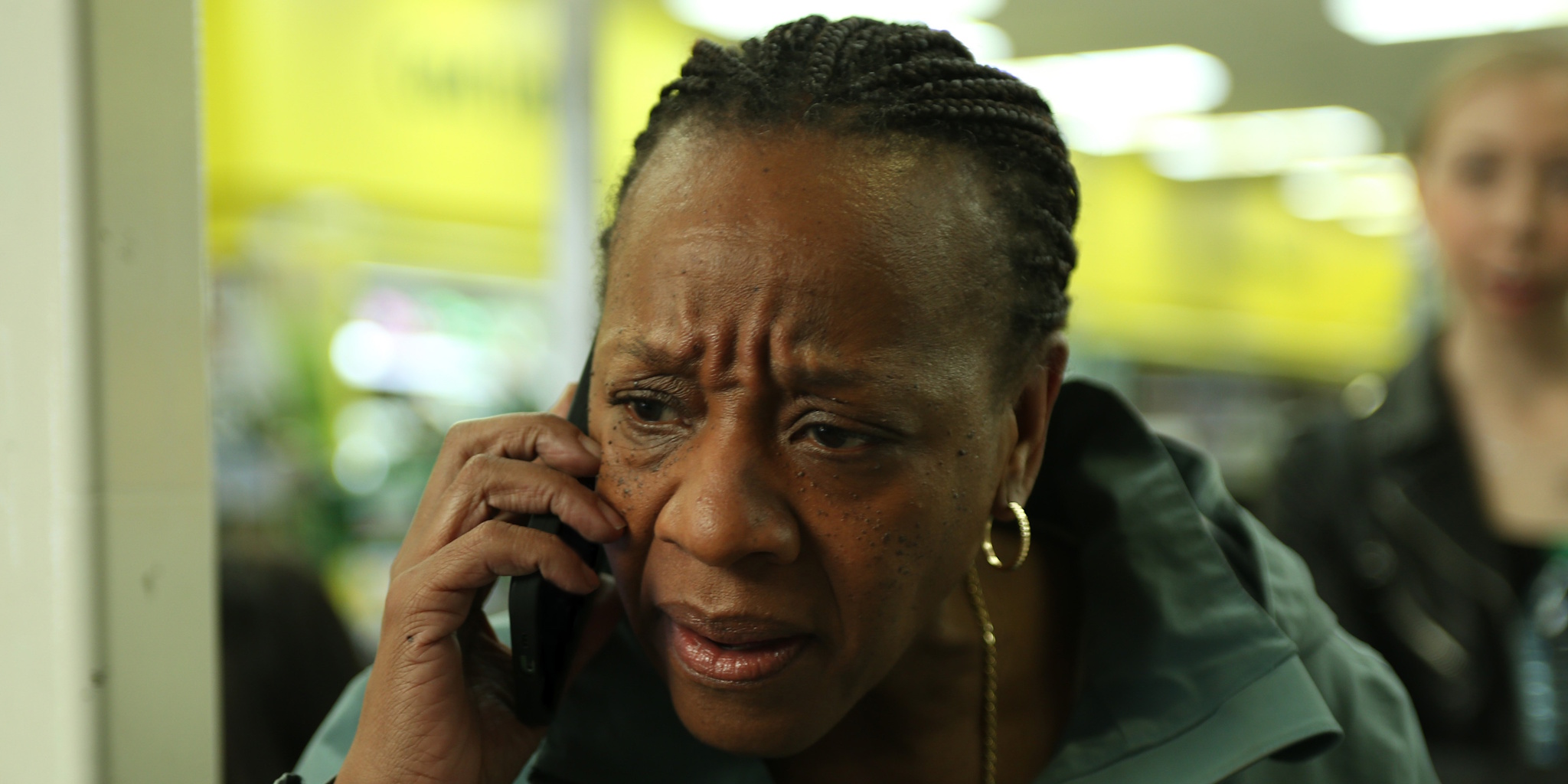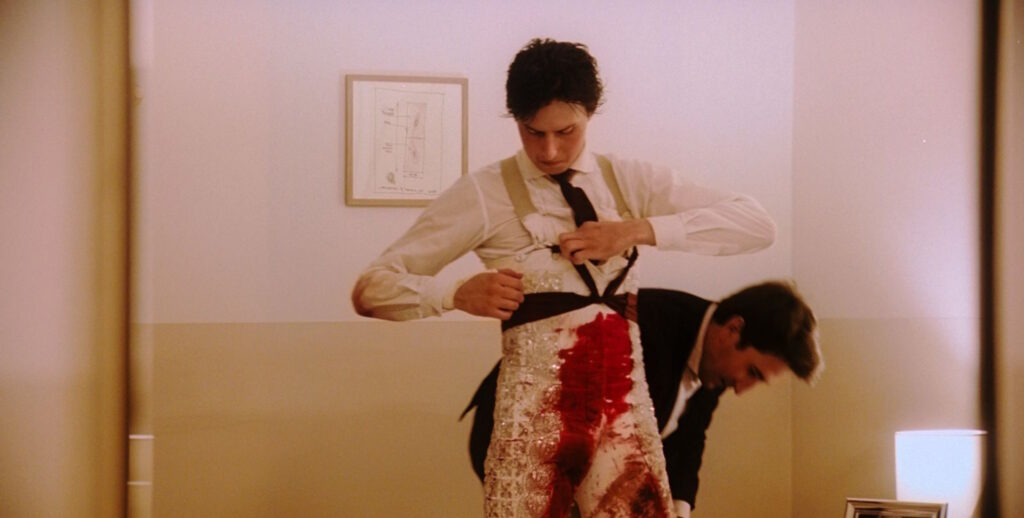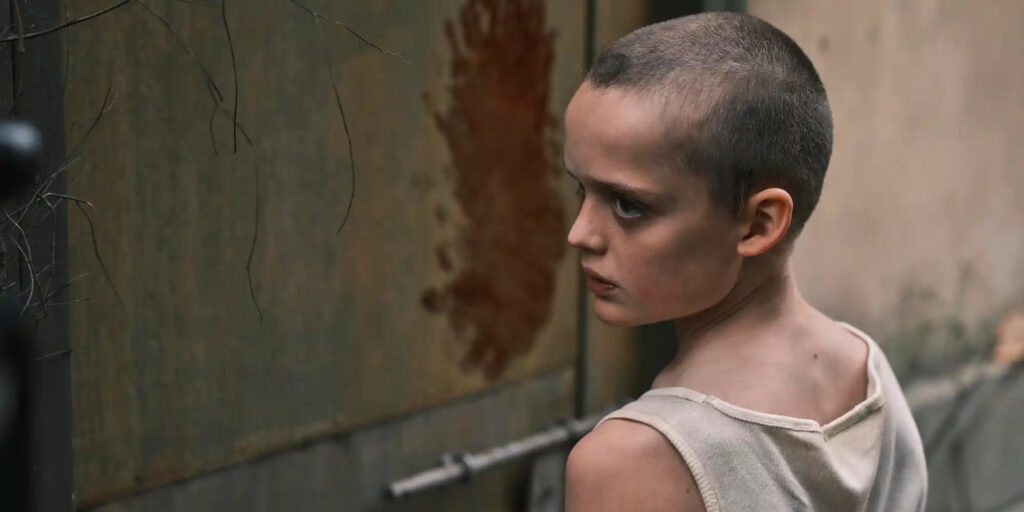British filmmaker Mike Leigh has an unassailable talent for rendering characters who are a lot, as they say. Pansy, the vitriolic protagonist of Leigh’s latest feature, Hard Truths, might be the most “a lot” person in the entire Leigh-verse. That’s saying something, considering that same cinematic world contains Johnny, the nihilistic, misogynistic thief whose aimless odyssey through London in Naked (1993) established Leigh’s international reputation. At least Johnny, as played by a never-better David Thewlis, had a scumbag, pub-philosopher charisma, one that permitted the viewer to understand why a woman might tumble into bed within him.
Pansy, meanwhile, is relentlessly awful. Portrayed by an utterly ferocious and enervating Marianne Jean-Baptiste – reuniting with Leigh almost three decades after their Oscar-nominated collaboration in Secrets & Lies (1996) – Pansy has a torrent of bile locked and loaded at all times for anyone who dares to look at her sideways. Seemingly every interaction with the world puts her out (and winds her up). Her terminally passive husband, Curtley (David Webber), and her delayed-launch adult son, Moses (Tuwaine Barrett), receive the brunt of her wrath, but no one escapes unscathed: her sister, nieces, doctors, service workers, random passersby, even the pigeons in her front yard. Notwithstanding the rules of conventional melodrama, Pansy’s razor-studded, acid-spewing outer shell does not conceal some secret, redeeming tenderness. She’s a miserable bitch, through and through.
Why is Pansy the way she is? This is the mystery at the heart of Hard Truths, although Leigh – consistent with the director’s penchant for anti-sentimentalist social realism – isn’t keen to resolve it with a pat explanation. Certainly, Pansy’s life doesn’t seem especially unbearable for a middle-age wife, mother, and homemaker. Curtley’s handyman wages have permitted the family a prosperous little rowhouse, one furnished in the bourgeois gray-laminate sterility that Pansy apparently prefers. She also insists on its spotlessness, responding to any speck or smudge – or, horror of horrors, an errant banana peel from her sullen, socially arrested son – as if were an unforgivable personal insult. Although her heritage is Jamaican, it’s as though Pansy has committed with manic intensity to the stereotype of a perpetually aggrieved middle-class white woman.
However, what afflicts Pansy is more alarming and debilitating than a workaday, Karen-esque inclination to browbeat any salesclerk luckless enough to cross her path. She is disproportionately belligerent in a way that seems genuinely unhinged, snarling at the dinner table about the despicable smiles of the charity workers she encountered earlier that day, while her long-suffering husband and son mutely avoid making eye contact. Ebenezer Scrooge only aspired to such misanthropy. Much of Hard Truths’ dialogue consists of epic, stream-of-thought monologues from Pansy on the malicious stupidity of everyone and everything, and on her own boundless, unacknowledged suffering. (As Justified’s Raylan Givens’ once opined, if you run into assholes all day long, you might actually be the asshole.) Pansy is always the victim, but if anyone ever fell for her self-aggrandizing wails of anguish, that time has long since passed. Everyone who is familiar with her caustic, hair-trigger temper simply tries to minimize their interactions with her. (Hence Curtley’s phantom-like presence in his own home, or Moses’ frequent strolls around the neighborhood, despite the looming threat of bullies.)
Something is wrong with Pansy, to be sure. Every time she wakes from sleep, it’s with a shrieking jolt, as if from a nightmare. She constantly complains of acute yet ambiguous pains in her joints, teeth, and bowels. Are these real maladies or simply malingering expressions of her dour, disdainful brand of narcissism? The film strongly suggests that she suffers from phobias and other untreated mental afflictions, but Leigh is not really encouraging the viewer to diagnose his protagonist. He simply asks that we spend 97 minutes in this noxious woman’s presence – a big ask, perhaps. However, part of the director’s singular magic is the way he effortlessly coaxes us into sympathizing with and even beginning to understand characters who are profoundly unhappy, frustratingly erratic, or just plain loathsome. Leigh pulls that same trick here with Pansy, with all the grace and depth one would expect of him.
Hard Truths leavens Pansy’s relentless vituperations with scenes centered on other members of her family, particularly her younger sister, Chantelle (Michele Austin). A single mother and hair stylist, Chantelle has a pragmatic but sunny disposition that feels like a cosmic correction to Pansy’s bottomless abyss of negativity. She has had a lifetime of practice wrangling her elder sibling’s venomous moods, which means that she knows when to let Pansy be Pansy and when to push back against her sister’s all-consuming resentments. “Why can’t you just enjoy life?” Chantelle wonders in exasperation at one point, a query to which Pansy can only reply, “I don’t know.” The older sister makes this admission while standing over the literal grave of their mother, but Leigh is careful not to assign too much ponderous symbolism to the moment. People are complicated, after all, and the usual suspects of genetic legacy and childhood experience only have so much explanatory power.
As in Happy-Go-Lucky (2008), Leigh’s latest feature asserts that the way people respond to failure and disappointment reveals something fundamental about their character. To that end, the film slides in superficially tangential scenes about Chantelle’s salon clients, who regale her with their joys and sorrows while she attends to their braids. Likewise, there are notable asides involving the professional lives of Chantelle’s young-adult daughters, Kayla (Ani Nelson) and Aleisha (Sophia Brown). Such sequences provide both a welcome tonal relief from Pansy’s incessant hostility and a crucial counterpoint to it. There is no overly moralistic motive in these implicit comparisons but rather a genuine fascination with human behavior. Consider how Leigh presents two different, ultimately inconsequential lies: the self-serving exaggerations that Pansy employs when recounting a confrontation with a stranger over a parking space, and Kayla’s fib to her sister about a career setback at the beauty-product company where she works. Both might be falsehoods, but Hard Truths asks the viewer to consider the subtleties of motive, context, and consequence that distinguish them.
Leigh is famously an actor-centered storyteller, developing his screenplays in close collaboration with his performers over weeks-long rehearsals. Such is the steamroller potency of Jean-Baptiste’s performance and the stark specificity of Pansy’s pathologies, however, that it’s easy to imagine that she and Leigh have permitted the character to slow-cook in a broth of pure poison for almost 30 years. Pansy is both uncomfortably authentic and just cartoonish enough that one feels permitted to chuckle at her more absurd tirades and insults. (“Ya look like a piece of string!” she screeches at a random woman in line at the grocery store.) Leigh might be an 81-year-old white Jewish filmmaker from Manchester, but together he and his performers convey the texture of the mostly assimilated British Jamaican community with a light yet memorable touch. It’s these details that lend Hard Truths a genuine, lived-in feeling. Witness the way that the Afro-Caribbean “teeth suck” punctuates the dialogue or the unspoken, gendered rules of hospitality that compel even modern women like Kayla and Aleisha to “fix a plate” for the men folk.
How a viewer responds to Hard Truths will likely depend on whether they find Pansy’s malice compelling or simply draining. Leigh’s feature has its moments of catharsis, but each time Pansy seems to be on the verge of a rattling self-realization, she retreats into the reassuring embrace of spitefulness. It’s not a feel-good film, in other words. This writer, for one, was deeply moved by Leigh’s latest – the director’s best since Vera Drake (2004) – albeit partly for reasons that are admittedly personal. There’s something discomfitingly familiar about Pansy’s mercurial mixture of hostility, anxiety, and despair, and more than once I caught myself nodding along with her invective, even as I attempted to keep in mind that she is a deeply unwell woman. During the aforementioned graveyard scene, Pansy at one point utters a shuddering sigh and announces, “I’m so tired. I just want to lie down and close my eyes. I want it all to stop.” Same, girl, same.
Hard Truths is now playing in select cities, and will expand to additional theaters in January.




